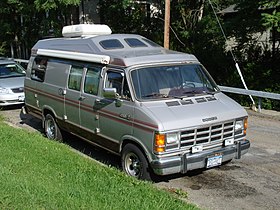Dodge Ram Wagon
| Dodge Ram Van | |
|---|---|
 |
|
| Overview | |
| Manufacturer | Dodge (Chrysler) Plymouth (Chrysler) (Voyager) |
| Production | 1971–2003 |
| Assembly | Windsor, Ontario, Canada |
| Body and chassis | |
| Class | Van |
| Body style | 3-door van 4-door van 3-door wagon 4-door wagon |
| Platform | Chrysler B platform |
| Chronology | |
| Predecessor | Dodge A100 |
| Successor | Dodge Sprinter |
| First generation | |
|---|---|
 |
|
| Overview | |
| Production | 1971–1978 |
| Body and chassis | |
| Class | Full-size van |
| Body style | Two-door or 8–15-passenger van |
| Powertrain | |
| Engine | 225 cu in (3.7 L) Slant-6 318 cu in (5.2 L) LA V8 360 cu in (5.9 L) V8 400 cu in (6.8 L) LA B V8 440 cu in (7.2 L) RB V8 |
| Second generation | |
|---|---|
 |
|
| Overview | |
| Production | 1979–1993 |
| Body and chassis | |
| Related | Plymouth Voyager (1979–1983) |
| Powertrain | |
| Engine |
3.7 L (225 cid) I6 110 HP (79–88) |
| Transmission |
3-speed automatic |
| Dimensions | |
| Wheelbase | 150 SWB: 109.6 in (2,784 mm) LWB: 127.6 in (3,241 mm) |
| Length | 1978–1990 150 SWB: 178.9 in (4,544 mm) 1978–1990 150 LWB, 250 & 350 SWB: 196.9 in (5,001 mm) 1978–1990 250 & 350 LWB: 222.9 in (5,662 mm) 1991–93 B150 (Wagon only): 187.2 in (4,755 mm) 1991–93 B250 and B350 SWB (Wagon only): 205.2 in (5,212 mm) 1991–93 B250 & B350 LWB (Wagon Only): 231.2 in (5,872 mm) |
| Width | 1978–1990: 79.2 in (2,012 mm) 1991–93 Wagon: 79.0 in (2,007 mm) 1991–93 Van: 79.8 in (2,027 mm) |
| Height | 1978–1990 150: 78.3 in (1,989 mm) 1978–1990 250: 79.9 in (2,029 mm) 1978–1990 350: 80.5 in (2,045 mm) 1991–93 B150 Wagon: 78.1 in (1,984 mm) 1991–93 B250 Wagon: 78.6 in (1,996 mm) 1991–93 B350 Wagon: 80.5 in (2,045 mm) 1991–93 B150 Maxi Wagon: 80.7 in (2,050 mm) 1991–93 Van (Extended): 80.1 in (2,035 mm) |
| Third generation | |
|---|---|
 |
|
| Overview | |
| Production | 1994–2003 |
| Powertrain | |
| Engine |
Magnum 3.9 L 175 hp (130 kW) V6 |
| Transmission |
3-speed automatic |
| Dimensions | |
| Wheelbase | 1998–20031500 SWB: 109.4 in (2,779 mm) 1994–97 1500 SWB: 109.6 in (2,784 mm) 2500 & 3500: 127.6 in (3,241 mm) |
| Length | 1500: 187.2 in (4,755 mm) 2500: 205.2 in (5,212 mm) 3500: 231.2 in (5,872 mm) |
| Width | 79.8 in (2,027 mm) 1994–96 Van: 79.0 in (2,007 mm) |
| Height | 79.5 in (2,019 mm) 3500 & 2500: 79.9 in (2,029 mm) |
The Dodge B-Series is a full-size van that was built by Dodge. Starting in 1981, the B-Series was sold as the Dodge Ram Van; the passenger variant was known as the Dodge Ram Wagon and Plymouth Voyager.
DaimlerChrysler discontinued production of the Ram Van and Ram Wagon after more than 30 years of production following the 2004 model year, replacing them with the Dodge Sprinter. All Ram Vans and Wagons were built at the Pillette Road Truck Assembly plant in Windsor, Ontario, Canada, which has since been demolished.
Built on the B platform (later AB), the full-size vans entered production for the 1971 model year. Due to a one-welded-piece "Uniframe" design, the Dodge platform was lighter and stronger and featured a lower cargo floor than the competition, at the expense of noise, vibration, and harshness (NVH). The resulting lower center of gravity improved handling versus the competing products. The B-series van was popular for cab-over motorhome conversion until Chrysler Corporation's egress from that market during their financial difficulties in the late 1970s.
All generations of the B-series van feature similar construction, with only small variation from era to era. The most pronounced changes were to the front fenders, hood, grille, and bumpers, which tended to follow their full-size truck counterparts in each era. Much of this was a result of the need to meet Federal "crash-worthiness" standards. Additionally, the first generation's side door was mounted back several inches, using a fixed panel between the passenger's side front door and the side door, allowing for more access to the side door without interfering with the front passenger's seat. This panel was eliminated in 1978 which was a transitional year for the B-series van. Similar construction for the entire 32 years of production made the Dodge Van very popular with upbuilders, service companies, and other fleets due to the compatibility of installable options from year to year without necessitating a redesign.
Dodge first pioneered the extended-rear 15-passenger van favored by school and church groups and dominated this market until overtaken by Ford in the 1990s. It offered a sliding side door as well as a unique side-swinging tail door with a full-width window.
...
Wikipedia
